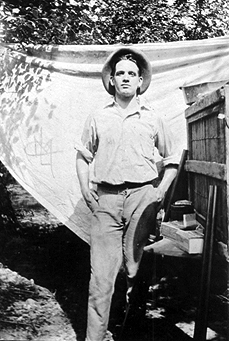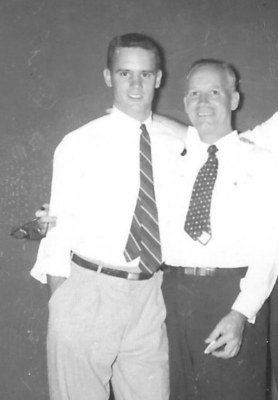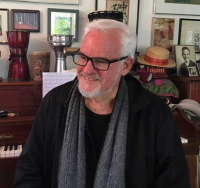.
.

Lance Minor (the author’s father) at age 14, 1918
.
My Father Sings
by William Minor
.
___
.
…..I grew up in a household where music was second nature, always present, ingrained. My mother could sight read well and played not only classical pieces on the piano (Schumann, Liszt, Chopin) but show tunes—the full range of Gershwin, Cole Porter, Rogers and Hart, Irving Berlin, which she and I sang together. The most joyous musical occasion was on holidays. My Uncle Max Gail, who ran an orchestra agency in Detroit and was an excellent stride pianist, came out to the house, along with his brother Bill, who played fine alto sax and clarinet, Herbie the Drummer, and Max’s beautiful wife, ex-Billy Rose Aqua-Queen Aunt Betty, along with their seven kids, all of whom played musical instruments and sang. We all took turns—as if we’d drawn numbers at Baskin-Robbins—performing.
…..My own musical efforts began at age twelve, with a homemade set of drums: the snare made of half a Quaker Oats box with tissue paper taped to the bottom and crossed by lines of thin wire. One cymbal was the lid from a Number Ten can of beans; the other, smaller, was from Campbell’s Soup—Cream of Mushroom, I believe. I made a set of wire brushes out of bristles I plucked from my mother’s prize broom. On this crude, strictly homegrown kit, I accompanied Teddy Wilson recordings: Swish ta-da swish ta-da swish ta-da swish.
…..I enjoyed classical music, but I loved jazz. I would actually see and hear Art Tatum, Erroll Garner, and Charlie Parker, live, at the Masonic Auditorium in Detroit. I eventually switched from drums to piano, taking lessons from a Pontiac, Michigan DJ named Dean Yokum, who came to our house. He liked to drink and he would give my older brother a lesson for an hour, retire to the kitchen with my father for an hour’s worth of Early Times, and when I got him for an hour he was ripe. But he was an excellent teacher and after a year, I could improvise. At age sixteen, I had my own combo that played for dances and proms in southeastern Michigan.
…..Over the years that followed, I would play at various venues with names such as the 456 Club (Brooklyn), The Hook and Ladder and Main Street Station (Wisconsin), Cannery Row’s Doc’s Lab and the Carl Cherry Center for the Arts (California), Swing City and Ami’s Bar: Scotch and Jazz (Japan). I played everything from folk rock to jazz to blues to country to bossa nova—and with groups with names like The Salty Dogs and Something Cool.
…..My early years had been home-grown and there’s no place quite like home in which to make music. The event that best defines what music means to me took place when I returned home for my parents’ sixtieth wedding anniversary. Because my plane was late arriving, my mother had stepped out to do some shopping and my father answered the door. He didn’t know who I was. Following an aneurysm operation, his mind was failing, most of his memory shot. When I told him who I was (his son!), he smiled.
…..“Well, Dor will be sorry she missed you,” he said.
…..“Dor” is my mother: short for Dorothy.
…..I told my father I’d hang around a little longer (in the house I’d grown up in) to see if Dor returned. He smiled, but no longer that famous smile that could charm the pants right off a snake. It was a genial, wistful smile now: puzzled but benign. I showed him photographs of my own children, now adults, but each time I turned a page he forgot what—or whom—he’d just seen. I said that I’d made them, just as he had made me. He nodded his head slowly, appraising the situation.
…..“First you made me, Dad; then I made them.”
…..When my mother returned and, once we got caught up on recent events (beyond who had manufactured whom in the past), she excused herself to prepare dinner in the kitchen. My father has always enjoyed hearing me play the piano, so I slipped over to the spinet on which I’d learned and began to play “Long Ago and Far Away.”
…..I do not recall my father singing during those sessions in the past when we all gathered around the piano, but he did show his rich appreciation by way of tap-dancing on smooth tiles in front of the fireplace, rendering his first-rate soft shoe: one leg drawn back, tentative, sweeping, the other teasing the carpet, then both legs sliding, smooth, caressing the marble, transforming that firm grid of tile to sandpaper while I played “Tea for Two.” “Play the ditty, Son,” he’d say, smiling in that way that everyone agreed was, like music itself, infectious.
…..Yet now, as I played, a miracle took place. This man, who seemed so lost to both time and even space outside his own home, began to sing. At first I thought I was imagining things. Yet I distinctly heard his voice, quavering, weak, but tender, vocalizing in time with the music: “Chills run up and down my spine, Aladdin’s lamp is mine …”
…..Chills did run up and down my spine and I nearly burst into tears: tears of sorrow, tears of joy, for the persistence of human memory, the indestructibility of human feeling. From what depths of being had he pulled out these words, from how many nights of song? What geologic layers had been shattered, like the miracle of that flower, the saxifrage which bursts through rock? I knew for whom he was singing.
…..It was not for the son he had once made (or helped make); it was for the woman in the kitchen preparing dinner with the percipience, poised prayer, compassion and inherent dignity she extends to nearly all that she does. For my mother, my father was singing, “Just one look and then I knew, that all I longed for long ago was you.”
.

The author and his father, 1954
.
___
.
“My Father Sings” was originally published in the author’s book, Gypsy Wisdom: New & Selected Poems. The owner of a local (Pacific Grove, CA) store, Bookmark Music, liked the prose poem very much and asked to submit it to a national contest, “What Music Means to Me,” sponsored by RPMDA (Retail Print Music Dealers Association). The story was awarded the national “grand prize winner,” and was honored as such at a convention in Naples, Florida. The story is reprinted with permission of the author.
.
.
photo by Stephen Minor
William Minor has published seven books of poetry, the latest Gypsy Wisdom: New & Selected Poems and Another Morning: Poems by William Minor–and published three books on jazz: Unzipped Souls: A Jazz Journey Through the Soviet Union; Monterey Jazz Festival: Forty Legendary Years; Jazz Journeys to Japan: The Heart Within. He plays jazz piano professionally, was commissioned to write a spoken word suite (Love Letters of Lynchburg), and has set poems to original music.
.
.
Listen to a 1944 recording of Bing Crosby singing Jerome Kern and Ira Gershwin’s “Long Ago and Far Away”
.
.
.







































